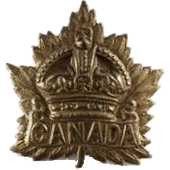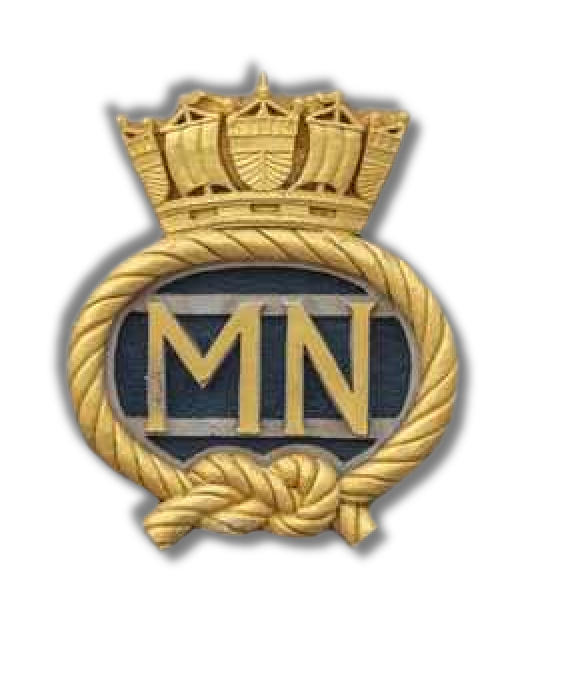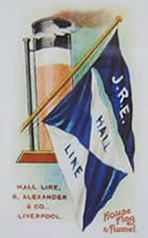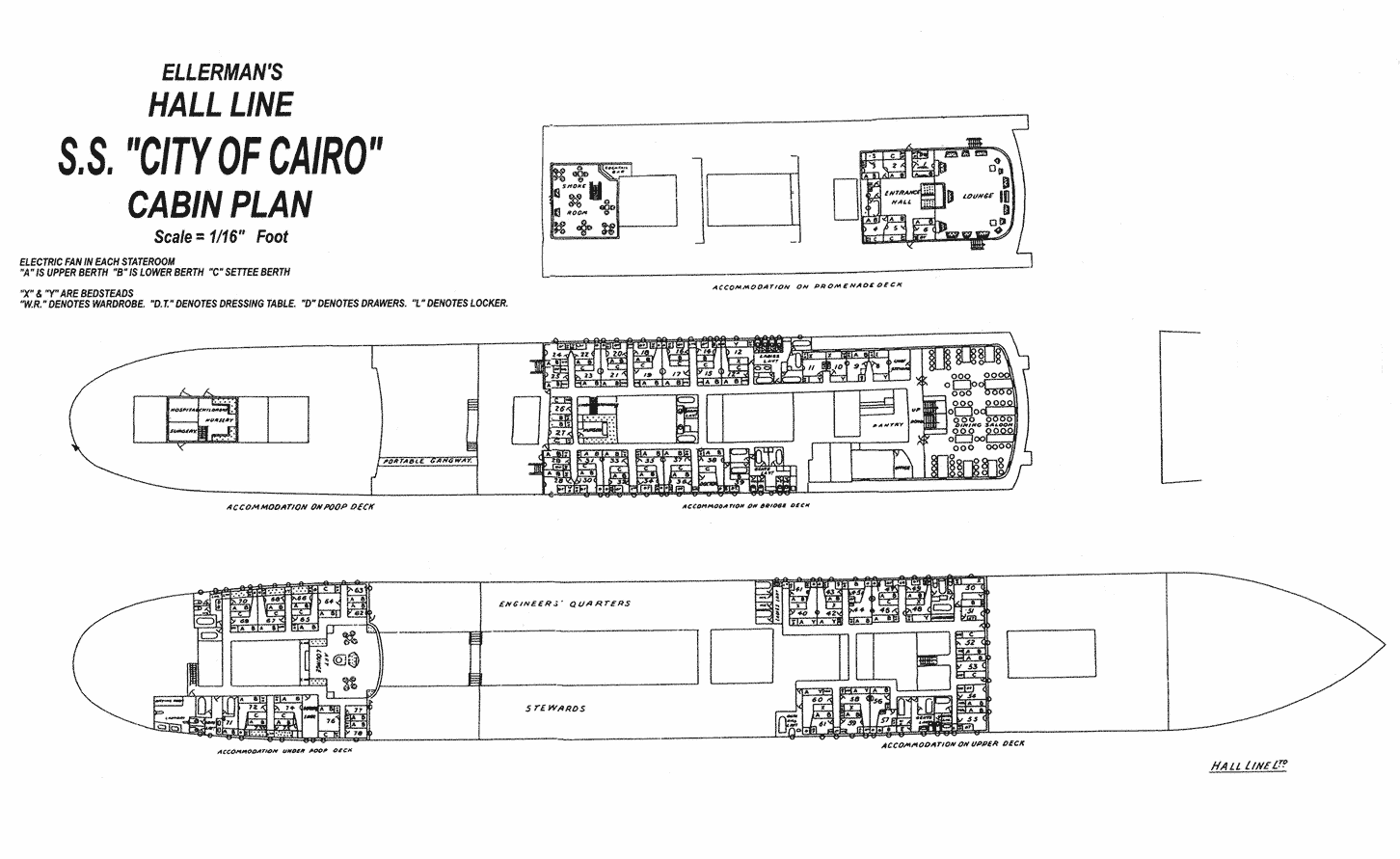The Diary of Pte A.S. Martin
I would like to thank Richard Chapman and Anthea Miller for allowing me to print their grandfather's diary.
Private Arthur S. Martin, Canadian Army, embarked aboard ss CITY OF CAIRO en route to England at the latter stages of WW1. The ship and others in convoy H.C. 19 were stricken with the Spanish Flu pandemic and arrived Devonport, England on 11 October 1918.
On completion of his service, Private A.S. Martin embarked aboard the troopship WINIFREDIAN on 17 July 1919 and arrived home on 30 July 1919 for demob. Read his very interesting story below.

Within this book I'll try to tell
What happened day to day
When I started on my journey
To France so far away
DIARY OF MY TRIP ACROSS THE ATLANTIC ON THE TROOP SHIP CITY OF CAIRO VOL. 1.

Enlisted in Kansas City Aug 23rd 1918. Arrived at Petawawa, our training camp, Aug 27th at 10pm.
I was with a friend named Herd & when the Conductor put us off at a little wayside station, he said this is Petawawa. We could not find anyone to ask the way to the camp & it was very dark & cold, so we started off up a road for a mile or two until we came to a bridge which we found out next day was the Petawawa River. At the other end of the bridge was the camp gate. Here we were stopped by the guard & held until a soldier came along and took us to our part of the camp. It was midnight when we got there & believe me we were thankful when they gave us some coffee & bread & meat. There was no tent ready for us so we slept in the recreation tent on the damp ground.
We got up early next morning before daylight & washed in what felt like ice water. We did not have much to do first day, they found tents for us & gave us most of our uniform.
Next day we started to drill, we were put in with men they called crocks so we considered ourselves one of them but we did not stay with the crocks only a day or two when they moved us up into No2 Company & in a little time we were up into No1.
We got up at Reveille 5.30 & dressed in fatigue uniform. At 6 o'clock was roll call, then for a run down the road to wake you up for about 45 minutes, then at 7 o'clock breakfast. After that we would shave & wash in the ice water which I mentioned before. We would also have our blankets to fold & packed outside our tents & we would have to have our tents swept out & our kits packed up in order.
At 7.45 we fell in for P.T. or Physical Torture as it is called. We would have this for one hour, then they only gave us fifteen minutes to change & put on our full dress uniform & be out on Parade for Inspection, then we would drill until eleven. Then we usually had a lecture from 11 to 12, then we had dinner & by that time we were ready to eat a horse. The afternoon would be spent doing the same thing until you were forming fours in your sleep.
Sept 14th. I was vaccinated & inoculated on the 18th was inoculated the second time. On the 23rd was given my third & had some kind of a horse doctor pull out four teeth & then I went to have my Medical Board & passed as A2 man.
Then we were told we were going overseas, they gave us a Pass for a couple of days. We left Patawawa for Montreal on Sept 25 at 10 p.m. We reached Ottawa at 6 a.m. & about three hours later we were in Montreal. Here we had a good feed & I think everyone got their fill, after that we left the Depot & it was raining & our Lieutenant marched us over the streets of Montreal with our overcoats on & carrying all our kit at a very fast pace until we were ready to drop with the load. When we reached the Wharf & got the word to halt every man was sweating and swearing & the steam was rising from our heads.
We had a long wait before we got on the Boat & most of us got a chill. About noon we were lined up & went aboard the City of Cairo the transport which we were to sail on. As we went aboard everyone got a card telling him which part of the Boat he was to be located in. The card I had read Section 2 Mess 25. We each found our location which was in the bottom of the Ship. Our mess was a table for twenty men which made it very crowded as it was only about 20 ft in length. Our first meal on board was at 2 p.m. & as we were eating, the Transport moved out of the harbour & into the River.
Then we were give Hammocks to swing for our beds, but I was one of the unlucky ones that did not get hooks to hang it on, so made up my bed on the table. The Hammocks were hung directly above the mess table & so close together as they could be. You can imagine how nice the table was for breakfast for everyone had to stand on it to get in & out of their Hammocks.
At 7 a.m. we had breakfast which consisted of porage frozen sausage, the kind that looks like a spotted dog & coffee. I say coffee but I think they scrubbed the deck with it first.
Then after breakfast we all went up on deck to look around & found we had not travelled very far & had been stopped for several hours. She was only a small Ship but she carried all the troops she could carry. We got started again & could see the big Steel Bridge which spans St Lawrence River & when we went under it I think every man was on deck to see it. It certainly is a wonderful piece of work & I believe the largest one ever built.
We then dropped anchor at Quebec about 10 a.m. At this time we had our first Boat Drill that is we were detailed at different stations near the lifeboats & rafts with an Officer in charge. They gave us instructions how to lower & get into the boats & rafts if anything should happen.
We stayed at Quebec all day & their were several other Transports lying at anchor near us. Night came & we had not moved so we went down to the hole to our Hammocks but again I had to sleep on the Mess Table. I woke up very early next morning & made for some fresh air. At 10 a.m. the anchor was raised & we were off down the River & I think it was the prettiest body of water I had ever seen.
We then had Boat drill & Roll Call again, this time we were ordered to put on our Life Jackets & not take them off until we land. It was a funny feeling that went through you when you put them on, but we had to laugh at each other for we looked like a sack tied up ugly. I thought I would have died laughing when I saw Lovett coming up on deck with his on for he is fat anyhow & these jackets are padded with some kind of cotton & he could scarcely get into his.
At 3 p.m. we dropped anchor again & at this time we had five other ships to the Convoy & we all think we are waiting for others. Here we stayed all night & I got down early & found a hook for my hammock. When I got up next morning I was as stiff as a board for we were swinging up to the beams & packed together like a lot of sheep. Up on deck for me for the Air was not fit to breathe down in the hole. It was raining hard, but I did not care & I stayed up their the rest of the day.
By this time we had eight ships besides ours, it was a pretty sight & also gave you a feeling of safety to have them beside us. Here we stopped again engine trouble this time the others kept going.
The City of Cairo was the second fastest Boat but her outward appearance does not look it. We got started again & caught up with the others during the afternoon & the weather had cleared up & made it much nicer on deck. No Smoking on deck after dark was the new order, so we had to be contented without having our after supper smoke.
The City of Cairo could not make her fastest speed because she was only allowed to travel as fast as the slowest Ship of the convoy & they make a zig zag course. The water at this time was getting a little rough & we lost sight of land, & our Hospital is nearly full already. It is not so much Sea sickness as the most of them seem to be down with the Spanish Flu.
Oct 1st We were again in sight of land & could see snow to the right of us. Before night we had lost all sight of land & do not expect to see it again until we reach the other side.
Oct 2nd On guard duty for twenty four hours. We were stationed at different parts of the Ship & we had rifles but no ammunition. We had to keep a sharp lookout for Submarines & keep order on deck. It seemed a foolish idea to have us stand there like a statue with an empty rifle & the sea was getting rough & the night was very cold.
Next morning we had the news that Bulgaria had given up the fight & that seemed to cheer everyone up.
We had a good view of an Iceberg it was quite close to us & when the Sun shone on it, it was a fine sight. At 4 p.m. there was a burial at Sea. A nurse on one of the other ships had died.
Most of the crew on this Ship are Lascars from India & when I was on Guard duty I was close to their quarters & I used to watch them eat. They never used a knife & fork & their food was cooked by one of themselves & served in one large dish. The dish is laid on the deck & they all sit down beside it & in they dig with their long fingers & it does not take them long to put it out of sight. They are small men & how they stand this cold weather from the North Atlantic I don't know.
Just been relieved of my last two hours Guard 9 a.m. I went down to take a little sleep. I slept until supper time & then got up & had my supper. Just as we had finished one poor fellow died on the floor close to our table. He was prepared for Burial at once that is he was sewed up in his blanket, then we carried him up stairs & he was left on the hatchway all night. He will be buried tomorrow.
Oct 4th The sickness aboard is steadily growing worse many of the men cannot get out of their hammocks & the floor is covered with men lying on the damp boards & the place smells very bad. I don't stay down there very long after I eat my meals or I would soon be one of the Sick.
At 4 p.m. we buried the poor fellow that died at the foot of our table. His comrades carryed him to the middle of the Ship & laid him on a stack of rafts while service was held. Then while the Bugler blew Taps the body was slipped over the side. This is the first burial I had seen at sea & I think I would rather die in the trenches than aboard Ship.
Oct 5th The Sea was getting rough again when we got up & by 10 a.m. we were all ordered below for we had run into a gale & were being tossed everywhere. But instead of going below I slipped up on the second deck & the rough Sea did not bother me a bit, so I stayed there until dark. Then I went down to help take care of the sick & I don't think I will ever forget the sight for the floor was packed with poor helpless fellows & the waves would come over the side of the Ship & down the Hatchways & just soak them, but they could not move.
I helped to move them around to dry places & then went on deck again to get some air. I found the City of Cairo was by herself & the other ships were out of sight & the Sea was running very high.
Oct 6thThe Storm continued all day long & still we could not see the rest of the convoy. 4p.m. we buried one of our own boys of the C.A.S.C. He had his seat next to me at the mess table. We all attended his burial & spread a large Union Jack over his body.
We had a canteen on board where we could buy cakes & apples & different things so I just used to be one of the regular customers & then I did not go down below until dark. That was why I did not get sick, for I knew I could not keep down the greasy dirty stuff they put before us.
Oct 7th The storm has settled a little during the night & it was somewhat warmer on deck, at 2 p.m. we could see three of the other ships and it gives one a better feeling to see them around when it so rough. At 4 p.m. two more were dropped over. A piper played the funeral march & the bugler blew taps. One of the Lascars died, but no one saw him buried. I expect they eat him.
Before night we could see all of our convoy but one of them had listed to one side. It was soon left behind & I never saw or heard of it after.
Oct 8th Up on deck the first thing, but it was still raining & we could not see very much for it was foggy & the sea was still choppy. This afternoon put five more over the side & the sickness is worse every day & it looks as we will loose many more for their are now about seven hundred sick & they don't know where to put them.
Oct 9th Still wet and stormy looks like we will never run out of it. I went on Hospital duty from 6 p.m. until 2 a.m. I was put up in the Isolation Hospital, that was on the Top deck & just a little two by four place. Just room for four beds. One poor fellow died during the time. Just before he died he said Good Bye Bill, but the other boys were getting better, the Dr only came up once during the night & he did not look to see if the fellow was dead, but just took the Orderlys word for it. I came off duty at 2 a.m. & went to my Hammock & their I heard that my tent mate that I had chummed with had died. It made me feel bad for he talked so much about coming on leave with me & also about his baby girl.
DIARY OF MY TRIP ACROSS THE ATLANTIC ON THE TROOP SHIP CITY OF CAIRO VOL. 2.
We landed here in England And here we had to stay The Kaiser thought he had better leave Because we were on the way
Our Captain first told us that two of our convoy had been lost & that a Torpedo had been fired at us, but luckily it just missed the bow of the Boat. It was at the time I was on duty in the Hospital and I can't see how we could have carried the poor boys out if it had struck us, for everything was in darkness.
This Afternoon we buried my friend & eight more with him, the total number of deaths up to now is twenty three. After the burial, the boys were tieing back the rafts to the side of the Boat, when the Warrant Officer came along & said never mind being too particular about them for we will need them again tomorrow & laughed as if it was a pleasure to him to see the poor fellows dropped over. I felt as if I wanted to push him over.
Oct 10th When I got on deck this morning I found our escort was with us. It was made up of six destroyers & they kept changing their positions around the convoy all the time.
It is raining again today & we cannot see very far & the Sea is rough & stormy & the destroyers at times are almost out of sight. Four more of the boys were given a watery grave.
Tonight our Ship left the rest of the convoy & went on with one destroyer & we expect to reach port tomorrow. All the boys who are feeling fit are looking forward to that time, but the poor fellows keep dying off & at 10 pm we buried four more.
Oct 11th Got up this morning & found ourselves sailing up the Plymouth Sound towards the harbour. Everyone was happy except the sick.
In the harbour we saw a couple of hydroplanes skimming the water & then taking to the air. We also saw a large observation balloon going out to sea fastened with a long cable to a speedy destroyer.
We were tied up to the wharf & were there all day, but when we will go ashore no one knows but we are thankful to be here safe & not sick.
It took us nearly all day carrying off the boys most of them were put in ambulances & taken direct to the Hospital and others who could walk were put on the train & taken to some convalescent. One of our boys told Herd my friend that he had laid on his bunk & saw his three bunk mates die & he thought he would be the next, but I think was over the worst part & will get better. There were Six more dead while we lay in the harbour one of the C.A.S.C being among them & three more of them died at the hospital that bringing the total number of deaths on the voyage to thirty seven & over three hundred still in hospital.
There were several Naval Training Ships here & they have a Naval School said to be the second largest in the world.
Oct 12 we got ashore at 8.30 am what a fine feeling to be on good old land again. We boarded the train which was waiting for us on the Wharf, the American boys were very much amused at the little engine & the small side door cars.
At 9 a.m. the train pulled out & we were on our way, but know one knows were. It was such a nice change after being on the Ocean so long. The country was beautiful that we passed, especially through Devonshire. I never thought that England was so beautiful.
We went through many towns & under the Severn River & into Wales. The people cheered us at every town, every time the train stopped for a few minutes, we were out looking for something to eat. We found it somewhat difficult because we could not get our American money changed. We stopped at one place where we found a place where they gave free lunch to Soldiers & Sailors. We rushed into the little place & about scared the Woman to death, & it was not but a little while before we had eaten everything she had.
We then passed through Bristol Shrewsbury & Chester & reached our Station about 9 p.m. which is called Abeyele. From here we had to march five miles with our blankets & Kit bags etc. We were all a little weak from our trip on the Boat & it was a hard march. We reached the camp about 11.30 tired & hungry. We were served with a hot supper which was very welcome. Then we went to our huts & tumble onto our board beds & everyone was asleep in a few minutes.
Oct 13th. Sunday our first day in a British Camp. It is known as Kinmel Park Camp & is in North Wales. We have no tents here like we had at Petawawa, but they are long wooden Huts & thirty of us to a Hut. Our beds are three boards about 6 ft long & they stand on little tressels about six inches high. We have a stove in the centre & up to now we have been fairly comfortable. We are quarintined here for twenty eight days, so we will not be able to see much or go outside the camp untill our Quarintun is lifted.
This now ends my Diary of my Trip across the Atlantic on the Troopship The City of Cairo.
Pte A.S.Martin 2688670
C.A.S.C
Notes on the text:
These diaries were written by my Grandfather who at the age of 35, then settled and living in Kansas City, Missouri, USA, left his wife and two small children and travelled to Canada to enlist for the defence of Great Britain in the latter stages of the Great War 1914 - 1918.
The diaries are contained in two small 6 inch by 4 inch notebooks and are written in continuous freehand text. I have transcribed the entries exactly as they are written, including spelling and punctuation, and have only added paragraph separation where I think appropriate.






